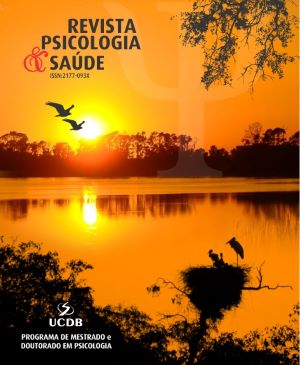Perception of the Health Team on the Implementation of Mother-Baby Rooming in a Psychiatric Unit
DOI:
https://doi.org/10.20435/pssa.v14i2.1670Keywords:
joint accommodation, mother-child relationship, mental health, humanization in hospital care, maternal and child healthAbstract
The mother/baby rooming in a Psychiatric unit is an alternative to protect the bond and maintain the parental care. This study aimed to know the professionals positioning, suggestions and needs in the face of a mother-baby rooming implementation. It is a qualitative research with 28 professionals from the health team of a psychiatric unit located in a public general hospital. Participants answered an instrument with closed and open questions. The results showed sensitivity, empathy, and motivation of professionals to contribute to the effectiveness of the project. To do so, they pointed out the need for changes in the physical structure, the unit management, and the team training. The participants consider that the implementation can help the mother's recovery and avoid compromising her bond with the baby. However, they suggest the systematization in the intermittent mode. Thus, the results/suggestions of the team constitute subsidies for the coming stages of the implantation of the accommodation.
References
Academia Americana de Pediatria. (1957). Normas y recomendaciones para la atención del recién nacido en hospitales a término y prematuro.
Artmann, M. (2021). Implantação de alojamento conjunto mãe-bebê em unidade psiquiátrica [Dissertação de Mestrado, Universidade Franciscana]. DOI: https://doi.org/10.48195/jie2021-189
Bowlby, J. (1981). Cuidados maternos e saúde mental. Penguin Books-CIP Brasil.
Brockington, I. (1962). Motherhood and Mental Health. Oxford University.
Cazas, O., & Glangeaud-Freudenthal, N. M.-C. (2004). The history of Mother-Baby Units (MBUs) in France and Belgium and of the French version of the Marcé checklist. Archives of Women’s Mental Health, 7(1), 53–58. https://doi.org/10.1007/s00737-003-0046-0 DOI: https://doi.org/10.1007/s00737-003-0046-0
Chandra, P. S., Desai, G., Reddy, D., Thippeswamy, H., & Saraf, G. (2015). The establishment of a mother-baby inpatient psychiatry unit in India: Adaptation of a Western model to meet local cultural and resource needs. Indian Journal of Psychiatry, 57(3), 290–294. http://doi.org/10.4103/0019-5545.166621 DOI: https://doi.org/10.4103/0019-5545.166621
Christl, B., Reilly, N., Yin, C., & Austin, M. P. (2015). Clinical profile and outcomes of women admitted to a psychiatric mother-baby unit. Archives of Women’s Mental Health, 18(6), 805–816. http://doi.org/10.1007/s00737-014-0492-x DOI: https://doi.org/10.1007/s00737-014-0492-x
Freddi, W. E. D. S., & Schubert, M. S. B. (1977). Considerações gerais sobre rooming-in (alojamento conjunto). Revista Brasileira de Enfermagem, 30(2), 136–144. DOI: https://doi.org/10.1590/0034-716719770002000009
Fundação Oswaldo Cruz. (2011). Nascer no Brasil. Fiocruz. https://nascernobrasil.ensp.fiocruz.br/?us_portfolio=nascer-no-brasil
Gilham, R., &Wittkowski, A. (2015). Outcomes for women admitted to a mother and baby unit: A systematic review. International Journal of Women’s Health, 30(7), 459–476. http://doi.org/10.2147/IJWH.S69472 DOI: https://doi.org/10.2147/IJWH.S69472
Griffiths, J., Taylor, B. L., Morant, N., Bick, D., Howard, L. M., Seneviratne, G., & Johnson, S. (2019). A qualitative comparison of experiences of specialist mother and baby units versus general psychiatric wards. BMC Psychiatry, 19(401). http://doi.org/10.1186/s12888-019-2389-8. DOI: https://doi.org/10.1186/s12888-019-2389-8
Klein, M., Heimann, P., Isaacs, S., & Riviere, J. (1982). Os progressos da psicanálise. Zahar.
Lebovici, S. (1987). O bebê, a mãe e o psicanalista. Artes Médicas.
Lei nº 10.216. (2001, 6 de abril). Dispõe sobre a proteção e os direitos das pessoas portadoras de transtornos mentais e redireciona o modelo assistencial em saúde mental. http://www.planalto.gov.br/ccivil_03/leis/leis_2001/l10216.htm
Leonel, F. (2016). Depressão pós-parto acomete mais de 25% das mães no Brasil. Portal Fiocruz. https://portal.fiocruz.br/noticia/depressao-pos-parto-acomete-mais-de-25-das-maes-no-brasil
Minayo, M. C. D. S. (2013). O desafio do conhecimento: Pesquisa qualitativa em saúde (14ª ed.). Hucitec.
Ministério da Saúde. (2004). Humaniza SUS: Ambiência. https://www.gov.br/saude/pt-br/acesso-a-informacao/acoes-e-programas/humanizasus
Ministério da Saúde. Resolução nº 466, de 12 de dezembro de 2012. (2013, 13 junho). Dispõe sobre diretrizes e normas regulamentadoras de pesquisas envolvendo seres humanos. Diário Oficial [da] República Federativa do Brasil. https://conselho.saude.gov.br/resolucoes/2012/Reso466.pdf
Ministério da Saúde. (2015). Saúde da criança: Aleitamento materno e alimentação complementar/Ministério da Saúde (2ª ed.). https://bvsms.saude.gov.br/bvs/publicacoes/saude_crianca_aleitamento_materno_cab23.pdf
Ministério da Saúde. Portaria 2.086. (2016, 24 outubro). Diretrizes para a organização da atenção integral e humanizada à mulher e ao recém-nascido no Alojamento Conjunto. https://www.in.gov.br/web/dou/-/portaria-n-2-068-de-21-de-outubro-de-2016-24358443
Ronchi, J. P., & Avellar, L. Z. (2013). Ambiência na atenção psicossocial infanto-juvenil um estudo no CAPSi. Saúde e Sociedade, 22(4), 1045–1508. http://doi.org/10.1590/S0104-12902013000400008 DOI: https://doi.org/10.1590/S0104-12902013000400008
Royal College of Psychiatrists. (2018). Building capacity, psychiatry leadership in perinatal mental health services. https://pcwhf.co.uk/resources/new-mental-health-guidance-for-mothers-to-be-and-new-mothers/
Santos, L. P., & Serralha, C. A. (2015). Repercussões da depressão pós-parto no desenvolvimento infantil. Barbarói, (43), 5–26. http://doi.org/10.17058/barbaroi.v0i0.3748 DOI: https://doi.org/10.17058/barbaroi.v0i0.3748
Silva, S. G. D. (2016). Do feto ao bebê: Winnicott e as primeiras relações materno-infantis. Psicologia Clínica, 28(2), 29-54. http://pepsic.bvsalud.org/pdf/pc/v28n2/03.pdf
Soares, M. V. B., & Carvalho, A. M. P. (2009). Mulheres portadoras de transtornos mentais e a maternidade. Revista Latino-Americana de Enfermagem, 17(5), 632–638. http://doi.org/10.1590/S0104-11692009000500006 DOI: https://doi.org/10.1590/S0104-11692009000500006
Spitz, R. A. (2004). O primeiro ano de vida (3ª ed.). Martins Fontes.
Winnicott, D. W. (1999). Privação e delinqüência. Martins Fontes.
Wright, T., Stevens, S., & Wouldes, T. A. (2018). Mothers and their infants co-admitted to a newly developed mother-baby unit: characteristics and outcomes. Infant Mental Health Journal, 39(6), 707–717. http://doi.org/10.1002/imhj.21742 DOI: https://doi.org/10.1002/imhj.21742
Published
How to Cite
Issue
Section
License
Copyright (c) 2022 Revista Psicologia e Saúde

This work is licensed under a Creative Commons Attribution 4.0 International License.
The articles published on journal Psicologia e Saúde holds the copyrights of all texts published by it. Due to that, there is a demand for a letter of copyright cession (see Appreciation). The full reproduction of any article of this Journal in other publications, by any means, requires a written authorization of the Editorial Board. Partial reproductions of articles (abstracts, more than 500 words of text, tables, pictures and other illustrations, sound files) should have the written permission of the Editorial Board and the Authors.












